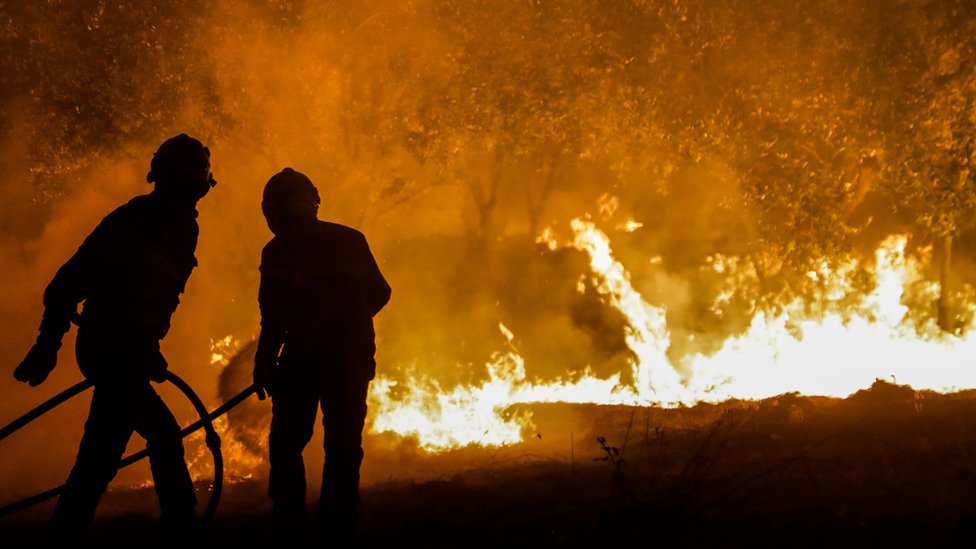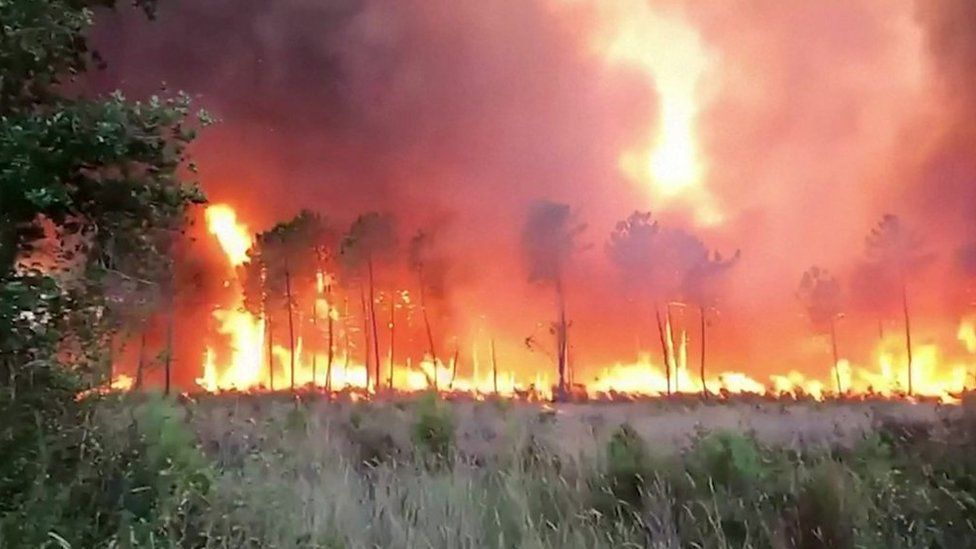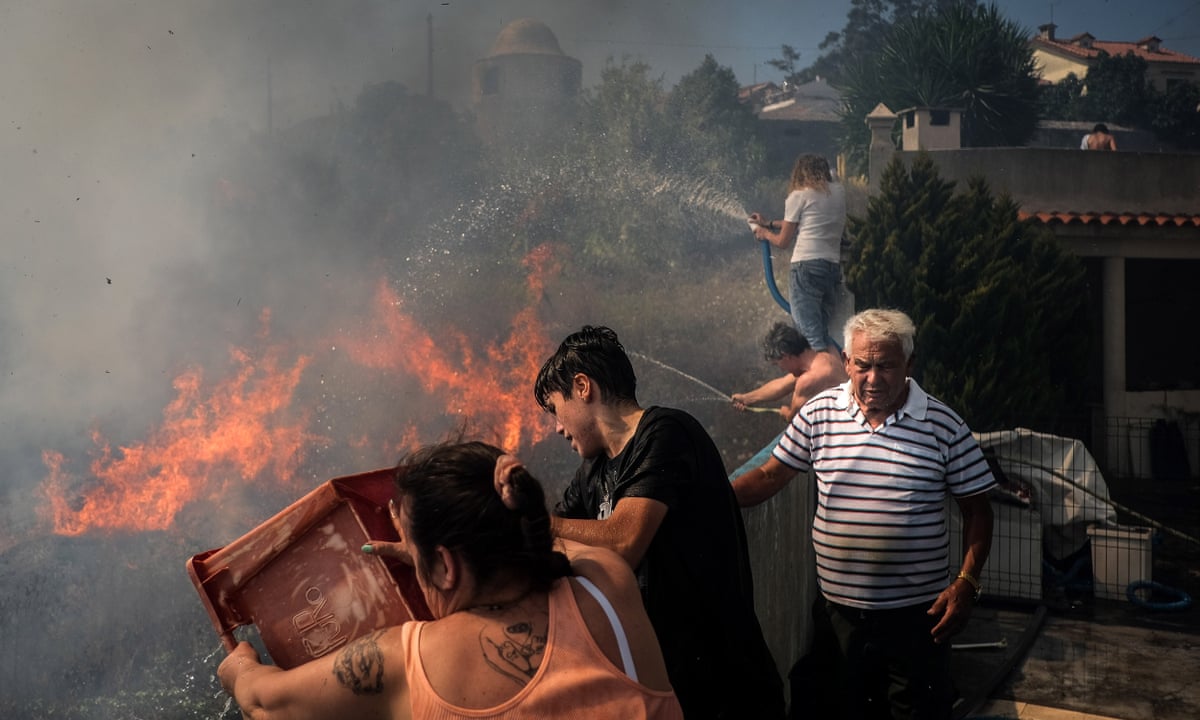Portugal’s Resilience Shines as It Combats Wildfires During Third Heatwave of the Year

Portugal’s Resilience Shines as It Combats Wildfires During Third Heatwave of the Year
In a display of unyielding resilience, Portugal finds itself once again battling the destructive forces of wildfires as the nation grapples with the relentless onslaught of a third heatwave in the current year. The rugged landscapes of this coastal nation have become a battleground, where firefighters, communities, and nature itself wage a relentless struggle against the encroaching infernos. The situation underscores the urgent need for comprehensive strategies to mitigate the impacts of climate change and manage the growing threat of wildfires.
As temperatures soar across Portugal, the country faces an unfortunate recurrence of circumstances that have become all too familiar in recent years. The combination of scorching temperatures, arid conditions, and gusty winds creates a perfect storm for wildfires to ignite and spread rapidly. While Portugal has made significant strides in bolstering its firefighting capabilities and adopting measures to prevent and manage wildfires, the intensity and frequency of these events continue to challenge even the most robust of preparations.
The current heatwave gripping Portugal is the third such event within a single year, pushing both resources and people to their limits. Authorities, already strained from previous fire seasons, are working tirelessly to respond to new incidents while keeping a watchful eye on active fire zones. Firefighters, the unsung heroes of these crises, are battling exhaustion as they wage a tireless campaign to save lives, homes, and precious natural habitats.

The impact of these wildfires extends far beyond the immediate danger they pose. The suffocating smoke blankets cities and rural areas, creating hazardous air quality conditions that endanger the health and well-being of vulnerable populations, particularly the elderly and those with preexisting respiratory conditions. Schools and businesses have been forced to close intermittently due to the risks associated with outdoor exposure, disrupting daily life and inflicting economic strain on already beleaguered communities.
The causes of these wildfires are complex, involving a blend of natural factors and human activities. While some fires are ignited by lightning strikes in the dry underbrush, an alarmingly high number result from human actions, whether through negligence or, in some cases, deliberate intent. Discarded cigarette butts, unattended campfires, and even machinery sparks can all act as triggers, highlighting the need for public awareness campaigns and stringent penalties for those found responsible.
Portugal’s forests, cherished for their biodiversity and ecological significance, suffer immensely in the wake of these infernos. Wildlife habitats are obliterated, and centuries-old trees succumb to the unrelenting flames. The loss is not only ecological but also cultural, as the forests hold a deep-rooted place in the nation’s history and folklore. Efforts to reforest and rehabilitate these areas are vital but demand sustained commitment and funding.

In response to the recurring crisis, Portugal has undertaken numerous initiatives aimed at improving its wildfire management capabilities. These range from investing in advanced firefighting equipment to enhancing the coordination between various agencies involved in fire response. Additionally, a growing emphasis on community engagement seeks to empower local residents with the knowledge and tools to prevent, manage, and respond effectively to wildfires.
The international community also plays a crucial role in Portugal’s battle against wildfires. Solidarity from neighboring countries and the European Union, in the form of firefighting resources and expertise, underscores the interconnectedness of global efforts to combat climate change-related challenges. While Portugal’s situation is undoubtedly dire, it is not alone in facing the wrath of increasingly frequent and intense wildfires; a united front is essential in curbing their devastating impacts.
As Portugal navigates its way through this challenging period, policymakers must acknowledge the broader context in which these wildfires unfold. Climate change, driven by human activities such as deforestation and greenhouse gas emissions, exacerbates the conditions conducive to wildfires. Adaptation and mitigation strategies must address these root causes and be integrated into wider national and international climate action frameworks.

In the face of such adversity, the Portuguese people’s resolve remains unshaken. Communities unite to support one another, demonstrating the remarkable capacity of human compassion in the darkest of times. From offering shelter to displaced families and animals, to providing sustenance to weary firefighters, these acts of kindness underscore the unbreakable spirit that defines Portugal.
In conclusion, Portugal’s ongoing battle against wildfires amid its third heatwave of the year showcases the nation’s courage and determination in the face of adversity. As the flames rage on, the collective efforts of firefighters, communities, and policymakers exemplify the strength of unity and the urgency of addressing climate change. While the road ahead remains challenging, Portugal’s unwavering resilience shines as a beacon of hope and a call to action for all nations to come together to safeguard our planet’s future.




